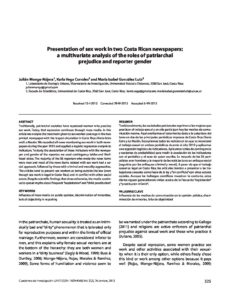This publication analyzes how prostitution is represented in Costa Rican print media, focusing on coverage in the widely circulated newspapers Diario Extra and La Nación during 2010. It examines how portrayals of sex work intersect with the gender of the journalists writing the articles. The study finds that while overtly repressive narratives may have softened over time, media representations continue to marginalize sex workers by framing them as outside the law or in conflict with society. This resource can support anti-trafficking practitioners in critically assessing how media narratives shape public understanding of prostitution and its perceived links to trafficking.
Tear of Publication: 2013
Author(s): Julián Monge-Nájera, Karla Vega Corrales, and María Isabel González Lutz
